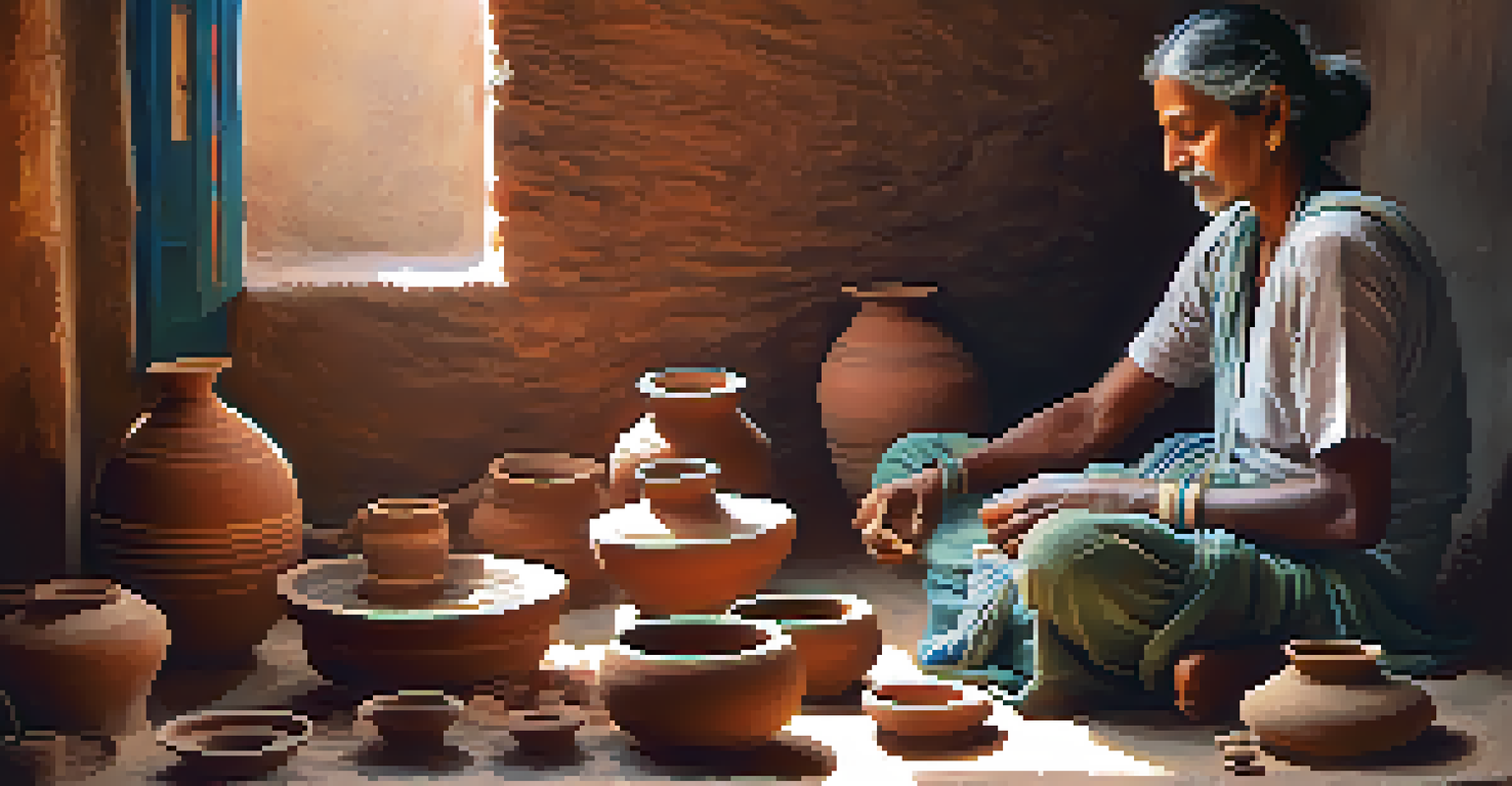Heritage Tours: Discovering India’s Rich Cultural Legacy

Understanding Heritage Tours and Their Significance
Heritage tours provide a unique opportunity to delve into the rich tapestry of a country's history. In India, these tours offer a blend of cultural experiences that highlight its diverse traditions, art, and architecture. Participants can explore historic sites, ancient monuments, and local customs, gaining insights that textbooks often overlook.
Traveling – it leaves you speechless, then turns you into a storyteller.
The significance of heritage tours lies in their ability to promote cultural awareness and appreciation. As travelers engage with local communities, they learn the stories behind the traditions and practices that have shaped the nation. This immersive experience fosters a deeper connection between visitors and the heritage they encounter.
Moreover, heritage tours contribute to the preservation of cultural sites and practices. By supporting local economies and encouraging sustainable tourism, travelers play a vital role in ensuring that future generations can experience India’s rich cultural legacy.
Top Destinations for Heritage Tours in India
India is a treasure trove of heritage sites, each with its own unique story. Cities like Jaipur, with its stunning palaces and forts, offer a glimpse into the royal history of the Rajputs. Meanwhile, Varanasi, one of the oldest cities in the world, invites visitors to witness traditional rituals along the banks of the Ganges River.

The ruins of Hampi and the intricate carvings of Khajuraho are also must-visit sites that showcase India’s architectural brilliance. These destinations not only highlight the country's rich history but also serve as reminders of the craftsmanship and artistry of ancient civilizations. Each location is a chapter in India's vast narrative.
Heritage Tours Promote Cultural Awareness
These tours allow travelers to engage deeply with local traditions and histories, fostering appreciation for diverse cultures.
Don't forget about lesser-known gems like Mandu and Orchha, which exude charm and tranquility. These off-the-beaten-path locations provide an authentic experience away from the bustling tourist crowds, inviting you to connect with the essence of Indian heritage.
Engaging with Local Cultures on Heritage Tours
One of the most enriching aspects of heritage tours is the chance to engage with local cultures. Tourists can participate in workshops that teach traditional crafts, such as pottery, weaving, or cooking local delicacies. This hands-on experience not only supports local artisans but also allows travelers to take home a piece of India’s heritage.
Cultural heritage is a bridge to understanding one another in our increasingly diverse world.
Interacting with local communities during these tours often results in unforgettable memories. Sharing meals with families, attending festivals, or learning folk dances creates a personal connection to the culture that can’t be replicated through mere sightseeing. These interactions make the journey more meaningful and transformative.
Furthermore, local guides often share stories passed down through generations, giving visitors a deeper understanding of the customs and values that shape the community. These narratives breathe life into the sites visited and create a richer context for the experience.
The Role of Sustainable Tourism in Heritage Tours
Sustainable tourism is increasingly important in preserving heritage sites and promoting cultural integrity. Heritage tours often emphasize responsible travel practices, encouraging visitors to respect local customs and minimize their environmental impact. This approach ensures that tourism benefits both travelers and the communities they visit.
By choosing eco-friendly accommodations and supporting local businesses, tourists can contribute to the preservation of cultural landscapes and traditions. This not only enriches the travel experience but also empowers communities to maintain their heritage in the face of modernization.
Sustainable Tourism Preserves Heritage
By supporting local economies and eco-friendly practices, heritage tours contribute to the preservation of cultural sites for future generations.
Additionally, many heritage tour operators are now actively involved in conservation efforts. They work with local governments and organizations to protect endangered sites and promote awareness of environmental issues, ensuring that India’s cultural legacy remains intact for future generations.
Culinary Heritage: A Taste of India’s Rich Culture
India’s culinary heritage is as diverse as its cultural landscape, offering a flavorful journey through its regions. Heritage tours often include culinary experiences, where travelers can savor traditional dishes and learn about the origins of various spices and recipes. This gastronomic adventure provides insight into how food connects with cultural identity.
Participating in cooking classes or food walks allows visitors to discover the stories behind beloved dishes. From the street food of Mumbai to the royal cuisines of Rajasthan, each meal tells a story of history, geography, and tradition that enhances the overall travel experience.
Moreover, food has the remarkable ability to bring people together. Sharing meals with locals fosters connections and creates lasting memories, making culinary heritage a vital component of the overall heritage tour experience.
Art and Crafts: Celebrating India’s Creative Spirit
India’s art and crafts are a vibrant reflection of its cultural diversity. Heritage tours often highlight local artisans and their unique craftsmanship, ranging from intricate textiles to stunning pottery. By visiting workshops and galleries, travelers can witness the creative process and understand the significance of these art forms in local culture.
Engaging with artisans not only supports their livelihoods but also provides insights into the techniques and traditions passed down through generations. This interaction helps preserve these art forms, ensuring they continue to thrive in a rapidly changing world.
Culinary Experiences Enhance Travel
Participating in local culinary traditions provides insights into cultural identities, making food an integral part of heritage tours.
Moreover, participating in craft-making sessions allows travelers to create their own souvenirs, adding a personal touch to their experiences. This blend of creativity and culture fosters a deeper appreciation for India’s artistic heritage.
Planning Your Heritage Tour: Tips and Considerations
Planning a heritage tour can be an exciting yet overwhelming task. To make the most of your experience, consider researching destinations that resonate with your interests, whether it's history, art, or cuisine. Knowing what you want to explore will help you select the right tour and activities.
It's also essential to choose a reputable tour operator that prioritizes sustainable practices and authentic experiences. Reading reviews and seeking recommendations can lead you to organizations that genuinely care about preserving cultural heritage while providing enriching experiences for travelers.

Finally, be open-minded and flexible during your journey. Embrace the unexpected, engage with locals, and allow yourself to be immersed in the culture. This willingness to explore will undoubtedly enhance your heritage tour experience, leaving you with lasting memories and a deeper understanding of India's rich cultural legacy.